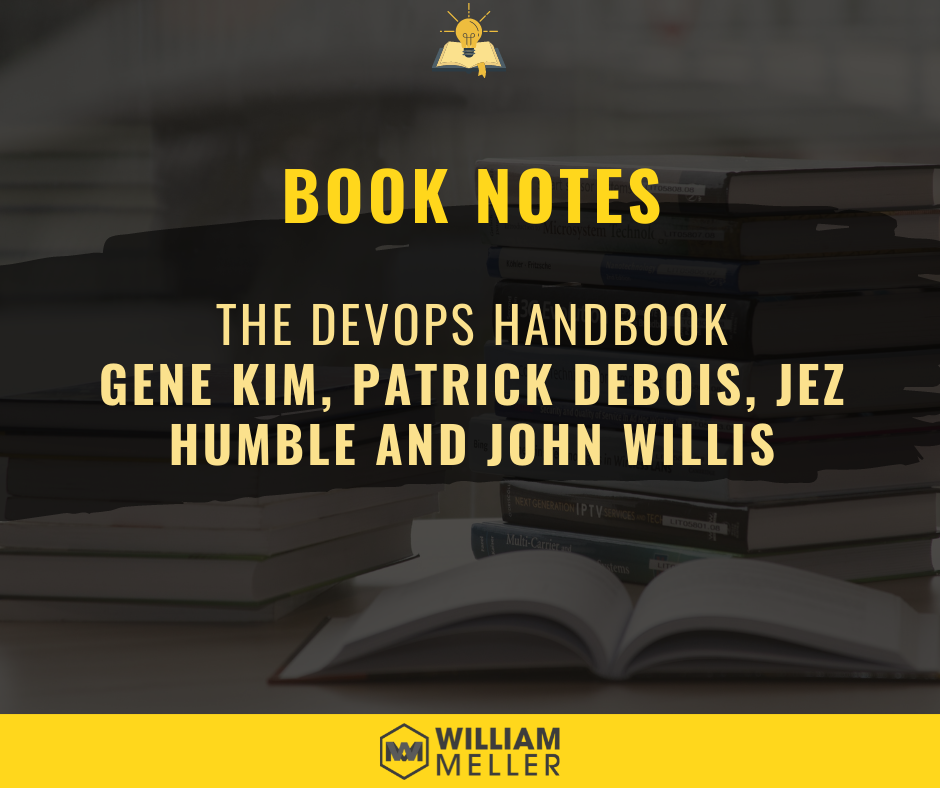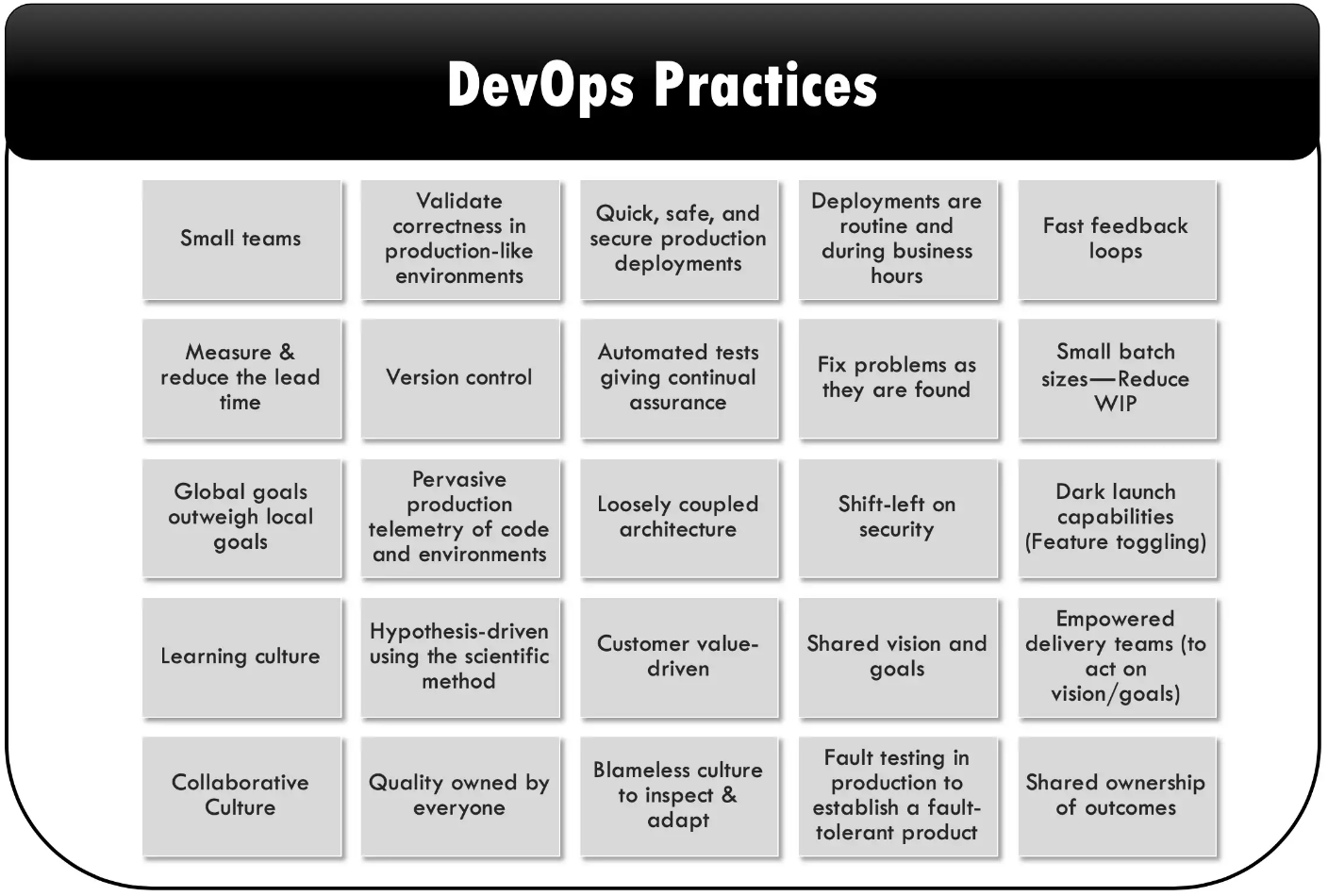
The DevOps Handbook shows leaders how to elevate their company IT stack with DevOps and win in the marketplace.
Summary
Title: The DevOps Handbook: How to Create World-Class Agility, Reliability, and Security in Technology Organizations
Author: Gene Kim, Jez Humble, Patrick Debois, John Willis
Themes: Leadership, Management, Business, Agile, Software, Lean, Scrum
Year: 2016
Publisher: IT Revolution
ISBN: 194278807X, 9781942788072
Pages: 480
More than ever, the effective management of technology is critical for business competitiveness. For decades, technology leaders have struggled to balance agility, reliability, and security.
And yet, high performers using DevOps principles, such as Google, Amazon, Facebook, Etsy, and Netflix, are routinely and reliably deploying code into production hundreds, or even thousands, of times per day.
The DevOps Handbook is a book written by Gene Kim, Patrick Debois, Jez Humble and John Willis that explores the principles and practices of the DevOps movement, which aims to improve collaboration and communication between development and operations teams in order to deliver software more quickly and reliably.
The book covers topics such as continuous delivery, infrastructure as code, and monitoring and metrics, and is intended as a guide for organizations looking to adopt or improve their DevOps practices.

The goal of DevOps is to move away from the adversarial behavior of teams, rallying instead toward common delivery goals by creating a safe, efficient, fast flow of valuable work to customers — minimizing the overhead of developing, testing, and deploying code.
Following in the footsteps of The Phoenix Project book, The DevOps Handbook shows leaders how to replicate these incredible outcomes, by showing how to integrate Product Management, Development, QA, IT Operations, and Information Security to elevate your company and win in the marketplace.

The DevOps handbook is one of the most important DevOps books available. It combines the most important DevOps ideas, examples from known companies, and best practices.
My Book Highlights:
"... DevOps is a manifestation of creating dynamic, learning organizations that continually reinforce high-trust cultural norms..."
"... In high-performing organizations, everyone within the team shares a common goal—quality, availability, and security aren’t the responsibility of individual departments but are a part of everyone’s job, every day..."
"... Ask a programmer to review ten lines of code, and he’ll find ten issues. Ask him to do five hundred lines, and he’ll say it looks good..."
"... It’s difficult to overstate the enormity of this problem—it affects every organization, independent of the industry we operate in, the size of our organization, whether we are profit or non-profit. Now more than ever, how technology work is managed and performed predicts whether our organizations will win in the marketplace, or even survive..."
"... Bill Baker, a distinguished engineer at Microsoft, quipped that we used to treat servers like pets: “You name them and when they get sick, you nurse them back to health. [Now] servers are [treated] like cattle. You number them and when they get sick, you shoot them..."
"... Management hints that the person guilty of committing the error will be punished. They then create more processes and approvals to prevent the error from happening again..."
"... By relentless and constant experimentation in their daily work, they were able to continually increase capacity, often without adding any new equipment or hiring more people..."
"... High performers use a disciplined approach to solving problems. This is in contrast to the more common practice of using rumor and hearsay, which can lead to the unfortunate metric of meantime until declared innocent—how quickly can we convince everyone else that we didn’t cause the outage. When there is a culture of blame around outages and problems, groups may avoid documenting changes and displaying telemetry where everyone can see them to avoid being blamed for outages..."
"... DevOps is a manifestation of creating dynamic, learning organizations that continually reinforce high-trust cultural norms..."
"... The core, chronic effect - when organization measurements and incentives across different silos prevent the achievement of global organizational goals..."
"... Every IT organization has two opposing goals, and second, every company is a technology company, whether they know it or not..."
"... Is defined as the process required to convert a business hypothesis into a technology-enabled service that delivers value to the customer..."
"... Organizations adopting DevOps are able to linearly increase the number of deploys per day as they increase their number of developers, just as Google, Amazon, and Netflix have done..."
"... A technology value stream is “the process required to convert a business hypothesis into a technology-enabled service that delivers value to the customer” — with the goal being to identify, and optimize this value stream..."
"... We can measure and improve our value stream by using lead time, process time, and percentage complete and accurate (%C/A) to inform value stream optimization..."
"... By limiting our WIP and reducing batch sizes, we’re reducing the potential for distraction and multi-tasking — improving our overall productivity..."
"... Limiting WIP makes it easier to see the problems that prevent the completion of work..."
"... The equivalent to single piece flow in the technology value stream is realized with continuous deployment, where each change committed to version control is integrated, tested, and deployed into production..."
"... Because failure is inherent and inevitable in complex systems, we must design a safe system of work… where we can perform work without fear, confident that any errors will be detected quickly, long before they cause catastrophic outcomes..."
"... The faster you can detect a problem with feedback (ideally in real-time), the faster you can act on the problem..."
"... Always make quality everyone’s responsibility — not just the responsibility of a single department or role..."
"... Effective change management policies will recognize that there are different risks associated with different types of changes and that those changes are all handled differently..."
"... Our goal should always be to maximize opportunities for organizational learning, continually reinforcing that we value actions that expose and share more widely the problems in our daily work..."
The DevOps Handbook presents several key concepts and practices that are central to the DevOps movement, including:
Culture: The book emphasizes the importance of creating a culture of collaboration, trust, and shared responsibility between development and operations teams in order to improve communication and reduce silos.
Automation: Automating as much of the software delivery process as possible, including testing, deployment, and infrastructure management, is a key aspect of DevOps.
Continuous Delivery: This concept focuses on the ability to release new software quickly and frequently, which is achieved by automating the testing, deployment, and release process.
Infrastructure as Code: This practice involves treating infrastructure, such as servers and networks, as code that can be managed, versioned, and automated, in the same way as application code.
Monitoring and Metrics: The authors stress the importance of monitoring and measuring various aspects of the software delivery process in order to identify bottlenecks and improve performance.
Lean principles: The book draws heavily from Lean manufacturing principles, which focus on eliminating waste and maximizing efficiency, to improve the software delivery process.
Feedback loop: The authors also discuss the importance of creating feedback loops to quickly identify and correct issues that arise during the software delivery process.
The most important lesson is that everyone needs to be exposed to other teams' problems. We all work towards a common goal in the end.
As we become more familiar with the problems of developers, testers, and operations, we can often find better solutions and fix problems earlier, and at a lower cost.
It does not have any code, so it is an ideal book for non-technical readers that would like to know what their teams are talking about.
Chapters of the Book:
1- Imagine a World Where Dev & Ops Become DevOps
2 - Agile, Continuous Delivery, and the Three Ways
3 - The First Way — The Principles of Flow
4 - The Second Way — The Principles of Feedback
5 - The Third Way — The Principles of Continual Learning & Experimentation
6 - Selecting Which Value Stream to Start With
7 - Understanding the Work in our Value stream
8 - How to Design Our Organization & Architecture with Conway’s Law in mind
9 - How to Get Great Outcomes by Integrating Operations into the Daily Work of Development
10 - Create the Foundations of Our Development Pipeline
11 - Enable Fast and Reliable Automated Testing
12 - Enable and Practice Continuous Integration
13 - Automate and Enable Low-Risk Releases
14 - Architect for Low-Risk Releases
15 - Create Telemetry to Enable Seeing and Solving Problems
16 - Analyze Telemetry to Better Anticipate Problems and Achieve Goals
17 - Enable Feedback So Development and Operations Can Safely Deploy Code
18 - Integrate Hypothesis Driven Development and A/B Testing into Our Daily Work
19 - Create Review and Coordination Processes to Increase the Quality of Our Current Work
20 - Enable and Inject Learning into Daily Work
21 - Convert Local Discoveries into Global Improvements
22 - Reserve Time to Create Organizational Learning and Improvement
23 - Information Security as Everyone’s Job, Every Day
24 - Protecting the Deployment Pipeline
Following in the footsteps of The Phoenix Project, The DevOps Handbook shows leaders how to replicate these incredible outcomes, by showing how to integrate Product Management, Development, QA, IT Operations, and Information Security to elevate your company and win in the marketplace.
Gene Kim is a multiple award-winning CTO, researcher, and author. He was the founder and CTO of Tripwire for 13 years. He has written four books, including “The Phoenix Project: A Novel About IT, DevOps, and Helping Your Business Win.” He is passionate about IT operations, security, and compliance, and how IT organizations successfully transform from "good to great." He lives in Portland, Oregon.
Patrick Debois is an independent IT consultant who is bridging the gap between projects and operations by using Agile techniques in development, project management, and system administration.
John Willis has worked in the IT management industry for more than 30 years. He has authored six IBM Redbooks for IBM on enterprise systems management and was the founder and chief architect at Chain Bridge Systems. He lives in Atlanta, Georgia.
Jez Humble is Vice-President at Chef. He has worked with a variety of platforms and technologies, consulting for non-profits, telecoms, financial services, and online retail companies. His focus is on helping organizations deliver valuable, high-quality software frequently and reliably through implementing effective engineering practices. He lives in San Francisco, California.
I am incredibly grateful that you have taken the time to read this post.
Your support and engagement mean the world to me, and I truly appreciate your interest in the topics I write about.
I hope that you have found this post informative, educational and engaging.
If you are interested in reading more of my work, please visit other articles here on the website.
I promise to continue providing valuable and high-quality content for your enjoyment and education.
Thank you again for reading and I hope to see you soon!
Here are some related articles you may enjoy:
There are even more good things I've prepared for you!
Subscribe here to receive new posts in your Email!
Do you want to read some book notes and recommendations? Discover more here!
Do you want to have amazing weekly content curation? Discover more here!
Ready to make a positive impact?
Support my work by sharing my content with your network.
Your simple act of kindness can reach new heights and help spread valuable information.
Want to show your support in a tangible way? A virtual coffee is a small but mighty way to show your appreciation and give me the extra energy to keep crafting valuable content!



